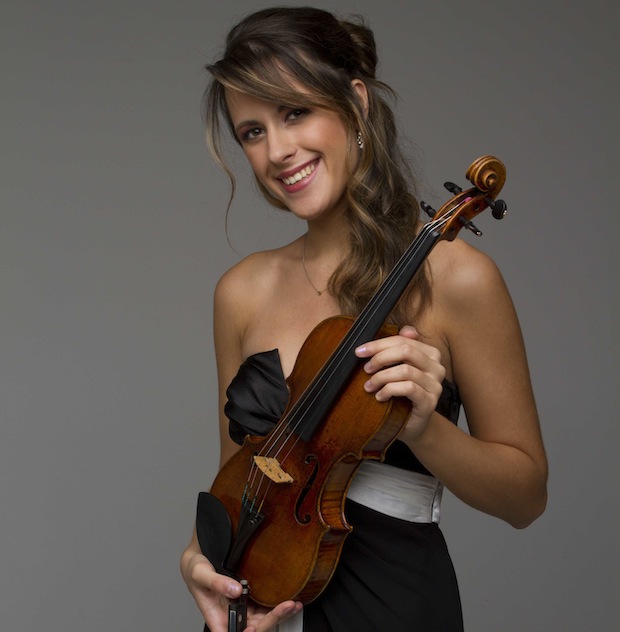Utah Symphony opens new year in briskly rewarding fashion

The Utah Symphony entered 2024 in bracing fashion under guest conductor David Danzmayr, the brisk tempos inside Abravanel Hall mirroring the brisk temperatures outside.
The Austrian conductor opened with a high-octane reading of Beethoven’s Coriolan Overture, signaling the kind of evening that was in store. Emphatic attacks and releases invested even the rests with an abundance of tension. The tempestuous main theme and the gentler secondary theme alike pulsed with urgency. At the overture’s close, which depicts the hero succumbing to his fate, Danzmayr gracefully guided the orchestra to a poetically reflective ending worthy of the score’s Shakespearean inspiration.
Italian violinist Francesca Dego was the evening’s soloist, bringing bright energy to her performance of Mozart’s Violin Concerto No. 3. This concerto is more about expressive elegance than pure technique and Dego saved the virtuosic flourishes for her encore, the Polish Caprice of Grażyna Bacewicz.
The violinist nonetheless impressed with her crisp articulation and the purity of her high notes. She brought a beautiful cantabile quality to the slow movement and engaging humor to the finale, like someone sharing a funny story at a party. The orchestra offered sinewy accompaniment, engaging in delightful repartee with the soloist in the first movement and bringing a kind of tipsy lilt to the second.
The evening’s major work, Beethoven’s Symphony No. 7, was introduced by a piece written in response to it: Carlos Simon’s Fate Now Conquers. Commissioned by the Philadelphia Orchestra to premiere in March 2020 and inspired by a bleak entry in Beethoven’s journal, Simon’s piece turned out to be prescient, as the world felt a bit battered by fate when it eventually premiered (on a digital platform) a few months later.
Fate Now Conquers explicitly relates to the Seventh Symphony, primarily by picking up the rhythmic motif of that symphony’s second movement and running with it. Yet one can also detect a few shards of other Beethoven symphonies including the Fifth and Ninth. The piece flew by in an exhilarating burst—with a brief yet haunting cello solo by Matthew Johnson—that felt much shorter than its five-minute running time.
Danzmayr and the orchestra sprinted to the finish line, clocking in the Seventh in what felt like record time. Though the musicians’ sheer athleticism was a little mind-blowing, there were a few moments when some of the music’s three-dimensionality was lost; a touch more of the delicacy Danzmayr brought to the conclusion of the second movement would have been welcome.
But on the whole, articulation was impressive and the work’s essence shone through. Oboist Zachary Hammond, in particular, brought main-character energy to his part. If only the Abravanel Hall audience could be cured of its habit of momentum-killing applause after every movement.
The program will be repeated 5:30 p.m. Saturday. utahsymphony.org
Posted Jan 06, 2024 at 2:21 pm by Moselle Eugen
The applause after every movement in the Mozart 3rd Violin Concerto and Beethoven’s 7th Symphony did not “kill” the “momentum.” That is more of a personal preference – otherwise why the energy of the audience applause? It is far better to have applause after every movement than any serial coughing in the audience during movements. There were none of these air-way distractions for such a well-attended concert. The applause in the Mozart added to the energy of the performance. Danzmayr was at his best in this concerto.
The performance of the Beethoven symphony had so much energy that the applause felt barely perceptible in the musical melee. The Coriolan Overture was far more interpretively interesting.
The orchestra likes David Danzmayr, and he makes a fine guest conductor, but should he be a finalist for the next music director of the Utah Symphony? One should have doubts.
Posted Jan 07, 2024 at 7:15 am by Mark Passey
You’ve stated tactfully what my curmudgeonly self must state more bluntly— Danzmayr’s Beethoven 7th was grotesquely rushed. So much so that the harried musicians could scarcely articulate individual notes in unison— all of the expressive symphonic phrasing of this Beethoven masterpiece completely obliterated.
At the end of the performance (I saw the Jan 6th) the audience bolted to a standing ovation. I just sat there stunned, thinking I must have lost my mind. I’ve seen many performances of the 7th in my years, so I was deeply disappointed by this odd experience. So, I specifically sought out your review for a sanity check. I’m glad to know that I’m not totally alone in my reaction.